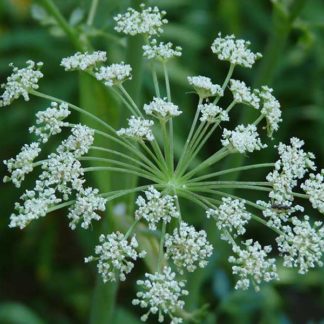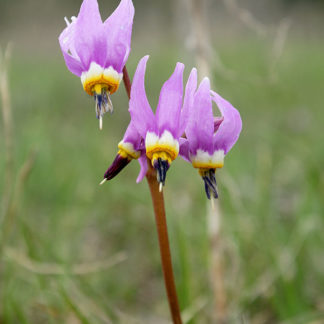moist meadows
Showing 1–12 of 47 results
-

Allium brevistylum / short-styled onion
- clusters of 7-15 urn-shaped flowers atop a single flowering stalk
- pink with 6 tepals
- leaves much shorter than the inflorescence
- leaves grow from base and are "grass-like"
- swampy meadows and along streams
- smells like onions/garlic
-

Anticlea elegans / mountain death camas
- cream to greenish-white flowers; overall hexagonal appearance
- branched flowering stem with multiple flowers not tightly packed
- 6 tepals (petals + sepals), greenish-yellow nectar glands
- grass/lily-like leaves
- blooms in summer (July/August)
-

Apocynum cannabinum / common dogbane
- herbaceous perennial with red stems and long/narrow leaves
- leaves have prominent veins
- leaves and stems exude white latex if broken
- white, bell-shaped flowers held erect in stalked clusters
- seedpods long, thin and brownish; in pairs
- often near streams or in moist places
-

Argentina anserina / silverweed
- silvery, compound leaves on low, creeping stems
- yellow, 5+ petaled flowers; lots of stamens
- fens, other wetlands, but also roadsides
-

Castilleja miniata / scarlet paintbrush
- bright red, or orange or sometimes yellow bracts that are mistaken for flowers
- looks like a red feather duster, but only a few inches long
- generally low, and along streams or roadsides on hills where there is moisture
- leaves ovoid with prominent veins, no petioles
-

Cicuta douglasii / water hemlock
- HIGHLY TOXIC
- primarily on continuously wet soils, e.g. ditches, stream banks, pond margins, marshes.
- white compound umbel inflorescence typical of the Apiaceae/Umbelliferae
- multiply compound leaves with prominent veins ending in notches between lobes
-

Cirsium scariosum / elk thistle
- usually tall, quite prickly thistle with deeply lobed, spiny leaves
- large, lavender (pink to purple) flowers hidden by the long leaves
- covered with white hairs giving it a silvery look overall
- in moist areas, in full sun
-

Clematis hirsutissima / hairy clematis
- striking, purple, upside-down vase
- four hairy sepals (not actually petals) fused to make the vase
- one flower per stem
- leaves divided into narrow leaflets
- moist or seasonally moist meadows
-

Cornus sericea / red osier dogwood
- shrub with opposite branching and red bark, brightest in fall/winter
- common along streams especially
- small white flowers, 4 petals, in clusters
- white or blue-ish white berries in fall
- opposite leaves with parallel veins
-

Danthonia californica / California oatgrass
- medium-sized, cool season bunchgrass
- florets widely spaced with long stalks on an open panicle
- may have flowering stems that appear wiry and crinkled
- when flowering, stamens are purple
-

Dodecatheon pulchellum / shooting star
- five pink to lavender lobes projecting backwards
- white or yellow petal bases above a squiggly purple ring
- anthers joined into a projecting point; stigma projecting past the point
- snowmelt to early spring
- wet meadows to sagebrush communities
-

Equisetum arvense / field horsetail
- segmented brown stems with spore-bearing "cone" at the tip
- or - segmented green stem with thin green branches radiating from nodes
- distinctly visible nodes along the stems
- no leaves or flowers
- found in many different habitats
Showing 1–12 of 47 results